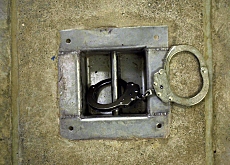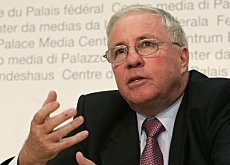Government rapped over forced disappearances

Non-governmental organisations have criticised Switzerland's failure to sign a new global treaty outlawing forced disappearances.
They say the government’s decision not to attend the official signing ceremony in Paris on Tuesday cannot be justified and smacks of a lack of political will.
“We hope Switzerland will sign it in the coming months and will then send the bill to parliament for ratification. But if we don’t keep up the pressure, it’s going to take years,” Philip Grant, president of the Geneva-based justice organisation Trial, told swissinfo.
“It took the Swiss 50 years to ratify the genocide convention and we don’t want the same thing to happen again.”
The treaty, which was adopted by the United Nations General Assembly in December, was negotiated in Geneva where its secretariat will be based. It outlaws forced disappearances and commits governments to making the practice a criminal offence.
The convention also recognises that, in certain circumstances, it can be considered a crime against humanity and therefore subject to an international criminal prosecution. According to Trial, the UN has logged more than 50,000 forced disappearances since 1980.
Urgent action
Last month a coalition of more than a dozen NGOs, including the Swiss sections of Amnesty International and the International Commission of Jurists, urged the government to sign and ratify the convention as quickly as possible.
“You don’t need to have everything in place when you sign; you need to have everything in place when you ratify, which might be a year or two later. So there’s no obstacle to signing and giving the convention a political push,” added Grant.
He said that while the issue of forced disappearances had been thrust into the limelight by the “war on terror” and CIA renditions, this represented just the tip of the iceberg.
“The accent should not just be put on the CIA stuff and the war on terror. If you look at the numbers, what’s happening in Pakistan, Sri Lanka and in other countries – where people are disappearing by the hundreds every year – is on a much bigger scale.”
Leading role
Reacting to the criticism, the Swiss foreign ministry stressed that the government had participated actively in the negotiations leading to the adoption of the treaty and had played a big part in its creation.
“We welcome the adoption of this convention, which is an important step towards a better protection, in the future, of people concerned by this serious violation of human rights,” said foreign ministry spokeswoman Carine Carey.
She explained that the government was unable to sign the treaty at present because officials were still examining whether changes to Swiss legislation were needed ahead of ratification. Areas under investigation include Swiss penal law, the rights of families of disappeared persons, as well as detainee registers.
“We do not sign international conventions without the assurance of being able to ratify them in a second step and to apply them,” said Carey.
swissinfo, Adam Beaumont
The convention says forced disappearance occurs when a person is deprived of their liberty with the direct or indirect support or acquiescence of a government, which then refuses to disclose the fate or whereabouts of that person.
The treaty outlaws secret detention and requires nations to hold all detainees in officially recognised places of detention.

In compliance with the JTI standards
More: SWI swissinfo.ch certified by the Journalism Trust Initiative


You can find an overview of ongoing debates with our journalists here. Please join us!
If you want to start a conversation about a topic raised in this article or want to report factual errors, email us at english@swissinfo.ch.